Middle East
Is Trump abandoning Israel? Not really | Israel-Palestine conflict
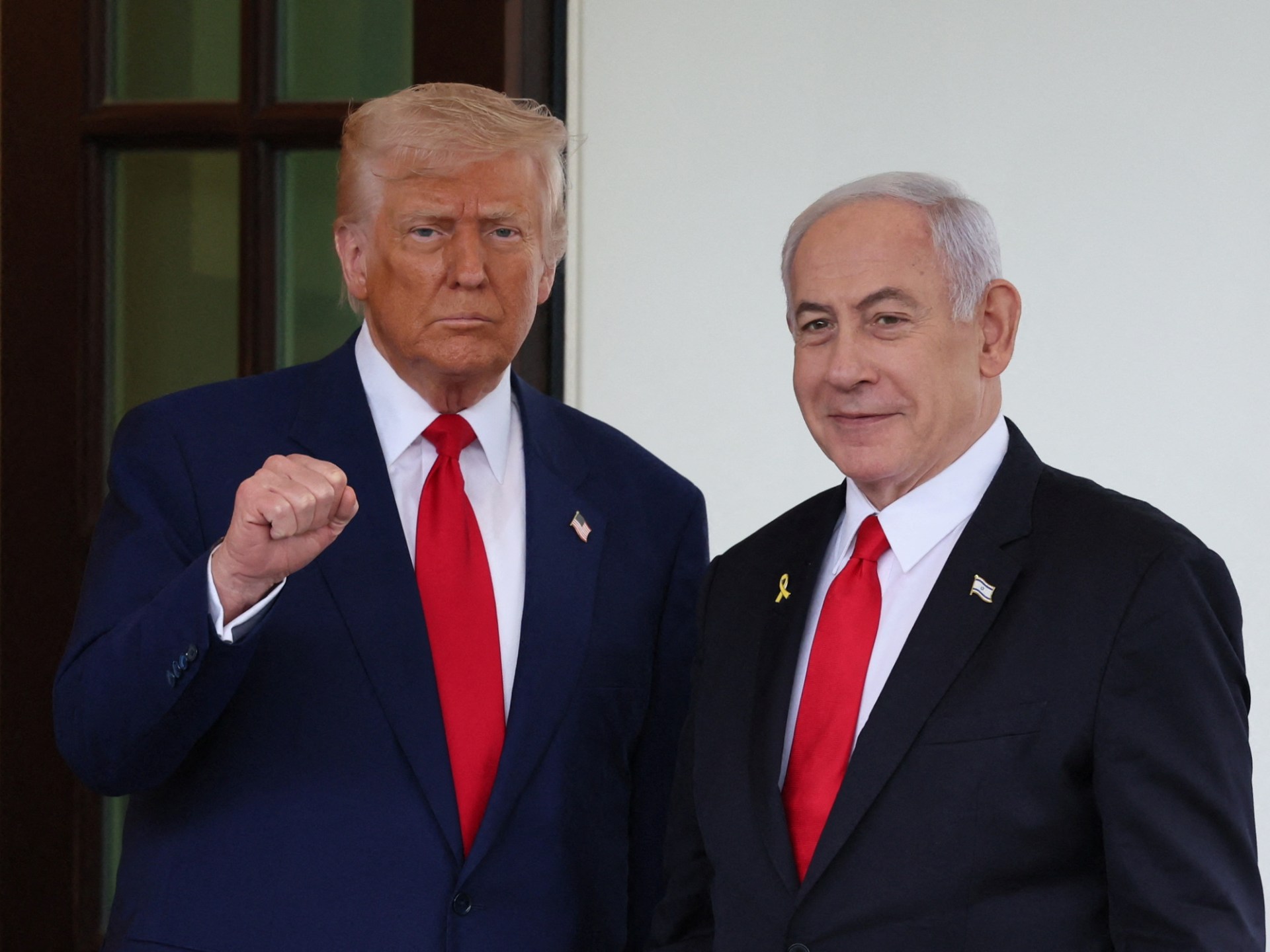
United States President Donald Trump descends on Tuesday on the Middle East for a regional tour that will begin in Saudi Arabia and include stops in the United Arab Emirates and Qatar. It is a business trip in every sense of the term, involving potentially trillions of dollars in investment and trade deals.
The UAE, for example, has already pledged $1.4 trillion in investments to the US over 10 years in sectors ranging from artificial intelligence and energy to mining and aluminium production. Saudi Arabia, for its part, has committed to investing $600bn in the US over the next four years. According to the Reuters news agency, Trump will also be offering the kingdom an arms package to the tune of $100bn.
Meanwhile, in keeping with the president’s solid history of nepotism and self-enrichment, it just so happens that the Trump Organization is currently presiding over real estate projects and other business ventures in all three Gulf countries he is slated to visit.
And yet one country is conspicuously absent from the regional itinerary despite being the US’s longstanding BFF in the Middle East: Israel, the nation that has for the past 19 months been perpetrating genocide in the Gaza Strip with the help of gobs of US money and weaponry. The official Palestinian death toll stands at nearly 53,000 and counting.
Although the genocide kicked off on the watch of his predecessor President Joe Biden, Trump was quick to embrace mass slaughter as well, announcing not long after reassuming office that he was “sending Israel everything it needs to finish the job” in Gaza. It appears, however, that Israel is taking a bit too long for the US president’s liking – particularly now that Israeli Prime Minister Benjamin Netanyahu has prescribed an intensified offensive against an enclave that has already been largely reduced to rubble.
The issue, of course, is not that Trump cares if Palestinian children and adults continue to be massacred and starved to death while Israel takes its sweet time “finishing the job”. Rather, the ongoing genocide is simply hampering his vision of the “Riviera of the Middle East” that will supposedly spring forth from the ruins of Gaza, the creation of which he has outlined as follows: “The US will take over the Gaza Strip, and we will do a job with it too. We’ll own it.”
So while war may be good for business – just ask the arms industry – it seems that too much war can ultimately be a counterproductive investment, at least from a Trumpian real estate perspective.
In the run-up to Trump’s Middle Eastern expedition, reports increasingly circulated of tensions between the US president and the Israeli prime minister – and not just on the Gaza front. On Sunday, NBC News noted that Netanyahu had been “blindsided – and infuriated – this past week by Trump’s announcement that the US was halting its military campaign against the Iranian-backed Houthis in Yemen”.
Even more annoying to the Israeli premier, apparently, is Trump’s refusal to endorse military strikes on Iran. Plus, the US has reportedly discarded the demand that Saudi Arabia normalise relations with Israel as a condition for US support for the kingdom’s civilian nuclear programme.
What, then, does the strained Trump-Netanyahu rapport mean for the ever-so-sacred “special relationship” between the US and Israel? According to an article published by the Israeli outlet Ynetnews: “Despite the tensions, Israeli officials insist behind-the-scenes coordination with the Trump administration remains close, with no real policy rift.”
The dispatch goes on to assure readers that US Ambassador to Israel Mike Huckabee has “denied rumors that Trump might announce support for a Palestinian state during the visit” to the three Gulf nations. Of course, it’s not quite clear what sort of “Palestinian state” could ever be promoted by the man proposing US ownership of the Gaza Strip and expulsion of the native Palestinian population.
Although Israel may be sidelined on this trip, that doesn’t mean it won’t continue to serve a key function in general US malevolence. Just last month, Israeli National Security Minister Itamar Ben-Gvir – source of the idea that there is “no reason for a gram of food or aid to enter Gaza” – was hosted by Republican officials at Trump’s Mar-a-Lago resort in Florida. After a dinner held in his honour, Ben-Gvir boasted that Republicans had “expressed support for my very clear position on how to act in Gaza and that the food and aid depots should be bombed”.
Flashy trillion-dollar Gulf deals aside, rest assured that the Trump administration remains as committed as ever to capitalising on Israeli atrocities.
The views expressed in this article are the author’s own and do not necessarily reflect Al Jazeera’s editorial stance.
Middle East
UN urges calm as heavy fire, clashes erupt in Libya’s Tripoli | United Nations News
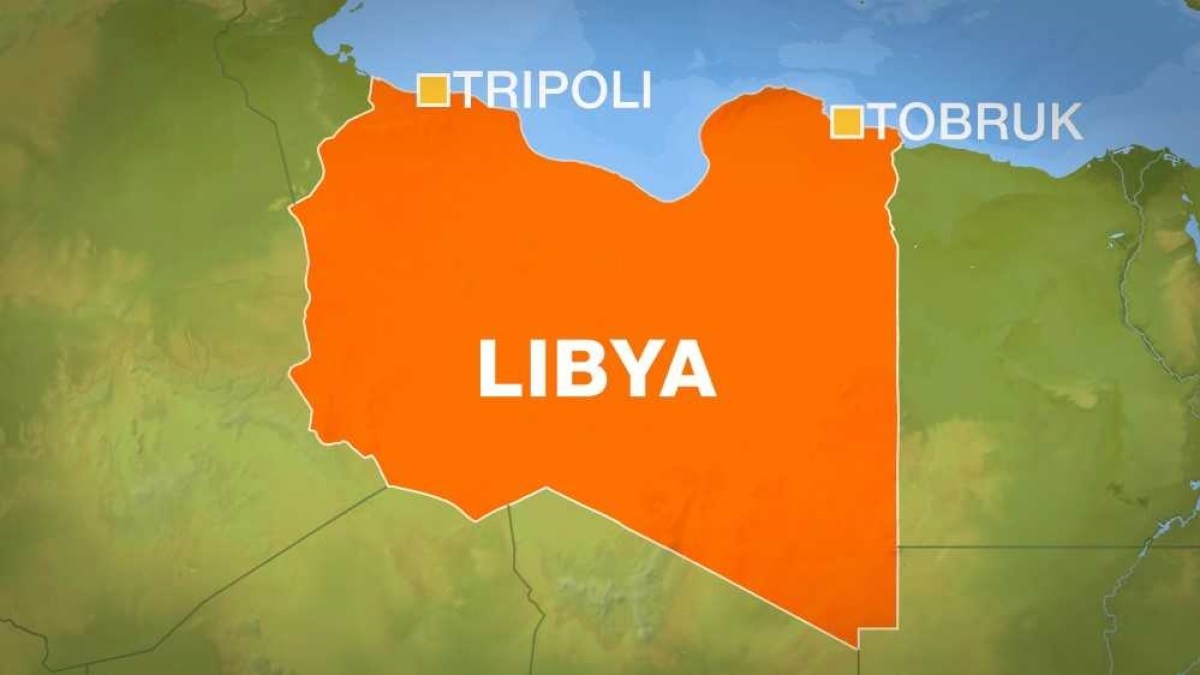
Interior Ministry urges residents to stay home and avoid movement, warning of further instability.
The United Nations has called for urgent de-escalation in Libya’s capital, Tripoli, as rival gunmen exchanged fire in the city’s southern districts after the killing of a powerful militia leader, prompting authorities to impose an emergency lockdown warning.
Residents reported hearing heavy gunfire and explosions across multiple neighbourhoods from about 9pm local time (19:00 GMT), according to journalists on the ground.
Reporting from Libya’s Misrata, Al Jazeera’s Malik Traina said security sources had confirmed the killing of Abdel Ghani al-Kikli, widely known as “Gheniwa”, who is the head of the powerful Stability Support Authority militia.
Gunfire and clashes then consumed several parts of Tripoli.
Al-Kikli was one of the capital’s most influential militia leaders and had recently been involved in disputes with rival armed groups, including factions linked to Misrata.
Traina said that at least six people have been injured, although it remains unclear whether they are security force members or civilians.
“People are angry that every time these armed groups clash, civilians are caught in the crossfire,” he continued, adding that residents are demanding “accountability”.
“When these groups fight and people are killed, no one is held responsible. Locals want justice, and expect the authorities to hold those behind the violence accountable,” he said.
In a statement early on Tuesday, the UN Support Mission in Libya (UNSMIL) said it was “alarmed by the unfolding security situation in Tripoli, with intense fighting with heavy weaponry in densely populated civilian areas”.
UNSMIL added that it “calls on all parties to immediately cease fighting and restore calm, and reminds all parties of their obligations to protect civilians at all times”.
UNSMIL is alarmed by the unfolding security situation in Tripoli, with intense fighting with heavy weaponry in densely populated civilian areas.
The Mission calls on all parties to immediately cease fighting and restore calm, and reminds all parties of their obligations to… pic.twitter.com/SZ8oKgZ1p8— UNSMIL (@UNSMILibya) May 12, 2025
UNSMIL voiced support for local mediation efforts, particularly those led by elders and community leaders, emphasising the need to protect civilians amid mounting tensions.
Schools shut, residents told to stay indoors
The Ministry of Internal Affairs urged residents to stay home and avoid movement, warning of further instability. Meanwhile, the Ministry of Education suspended classes across Tripoli on Tuesday, citing the deteriorating security situation.
Libyan social media platforms have been flooded with videos and images showing gunfire, plumes of black smoke rising, armed men in the streets and convoys entering the city.
Footage verified by Al Jazeera’s Sanad fact-checking agency captured the sound of medium-calibre gunfire in several neighbourhoods, including areas where the Stability Support Authority militia is known to operate.
Several districts have seen what local sources describe as “suspicious military manoeuvres”, with convoys arriving from Az-Zawiyah, Zintan, and Misrata – seen by many as preparations for a possible showdown in the capital.
The country plunged into chaos following a NATO-backed uprising that toppled and killed Libyan leader Muammar Gaddafi in 2011. The oil-rich nation has been governed for most of the past decade by rival governments in eastern and western Libya, each backed by an array of fighter groups and foreign governments.
Middle East
Renewed RSF shelling killed several in Sudan’s el-Fasher, army says | Sudan war News

The latest attacks come as the African Union rejects any ‘interference’ in the civil war, which has killed more than 20,000 people.
The Sudanese Armed Forces (SAF) have said the paramilitary Rapid Support Forces (RSF) killed seven people in artillery shelling on el-Fasher, the capital of North Darfur state in western Sudan.
A statement from the military-aligned government said on Monday that the RSF shelling that began late on Sunday targeted residential neighbourhoods, killing seven people, including women and children, and wounding at least 15, who were taken to hospitals.
On Sunday, the army also said the RSF shelling in the city killed nine people.
El-Fasher has witnessed intense fighting between SAF and RSF since May 2024, despite international warnings about the risks of violence in a city that serves as a key humanitarian hub for the five Darfur states.
For more than a year, the RSF has sought to wrest control of it, located more than 800km (500 miles) southwest of the capital, Khartoum, from the Sudanese army, launching regular attacks on the city and two major famine-hit camps for displaced people on its outskirts.
The RSF and the SAF have been locked in a brutal power struggle since April 2023, resulting in thousands of deaths and pushing Sudan into one of the world’s worst humanitarian crises, according to the United Nations.
More than 20,000 people have been killed and 15 million displaced in the brutal civil war now in its third year, according to UN and local figures. However, some United States-based researchers estimate the actual death toll to be as high as 130,000.
Won’t accept ‘any interference’
Meanwhile, the African Union (AU) said on Monday it would not accept “any interference” in Sudan after the RSF was accused of receiving weapons from the United Arab Emirates (UAE).
Last week, the Sudanese government severed diplomatic relations with the UAE, accusing it of supplying weapons to the RSF.
Amnesty International has also accused the UAE of supplying weapons to the RSF, in violation of a UN arms embargo.
The UAE has rejected the claims as “baseless”.
“The Commission’s position is that member states are sovereign states, and the AU Commission will not accept any interference in the internal affairs of Sudan,” said AU Chairperson Mahamoud Ali Youssouf.
“We will not support any intervention, any interference in the crisis in Sudan,” he said.
However, Youssouf declined to comment on the UAE’s possible role in the conflict. “It is not the role of the AU. Sudan has accused the Emirates; it is up to Sudan to provide this evidence,” he said.
The foreign minister of Djibouti was elected head of the pan-African organisation in February, inheriting multiple conflicts and a record of ineffectual statements.
Among the top of his priorities coming into the post was the Sudan civil war, which has effectively cleaved the country in two.
Both sides have been accused of committing war crimes.
In recent days, drone attacks attributed by the army to the RSF have increased, marking a turning point in the two-year conflict.
Drone attacks have also notably targeted strategic sites in Port Sudan, the temporary seat of government and the logistical humanitarian epicentre.
In February, UN Secretary-General Antonio Guterres urged a halt to the “flow of arms” into Sudan.
Middle East
UK veterans allege war crimes by British forces in Afghanistan, Iraq | Crime News

Detainees were regularly executed and unarmed people killed in their sleep during night raids, according to ex-soldiers.
Former members of the United Kingdom’s special forces have described alleged war crimes committed by British soldiers in Afghanistan and Iraq dating back over a decade.
More than 30 witnesses who served with or alongside special forces soldiers broke their silence to the BBC’s Panorama programme and spoke about illegal killings and executions of detainees, including children, during the invasions of the two countries.
David Cameron – who was prime minister from June 2010 to November 2013, the period now under scrutiny by a judge-led public inquiry into special forces – was repeatedly made aware of concerns about night raids and killings raised by then-Afghan President Hamid Karzai, according to the BBC.
A spokesman for Cameron said “any suggestion that [he] colluded in covering up allegations of serious criminal wrongdoing is total nonsense”.
The special air service and the navy’s special boat service, the UK’s top special forces units, were at the centre of the testimonies.
“They handcuffed a young boy and shot him,” recalled one veteran who served with the elite soldiers in Afghanistan. ”He was clearly a child, not even close to fighting age.”
Killing of detainees “became routine”, the veteran said, adding that the soldiers would remove plastic handcuffs from executed detainees and plant weapons by their bodies to make it look like they were fighters in photographs taken from the scene.
Another veteran with the navy’s special forces regiment said some service members displayed “barbaric” and “psychopathic” behaviour as they felt untouchable by the law.
One former soldier described the killings as something that could turn “addictive” as some soldiers became “intoxicated by that feeling” in Afghanistan.
“On some operations, the troops would go into guesthouse-type buildings and kill everyone there,” he said. “They’d go in and shoot everyone sleeping there, on entry. It’s not justified, killing people in their sleep.”

Even wounded people who did not pose a threat to anyone were executed in breach of international law, witnesses said, speaking on condition of anonymity.
A former special forces operator said an execution of an unarmed person in Iraq was never properly investigated, adding that senior commanders were aware of the problem long before deploying to Afghanistan.
The BBC also obtained new video evidence that showed squadrons kept kill counts to compete with others.
One veteran said a former colleague was trying to get kills on every single operation, having become “notorious” for killing dozens of people.
Another veteran said “everyone knew” about the killings in the UK special forces command with testimonies indicating officers would falsify postoperational reports to avoid scrutiny.
-
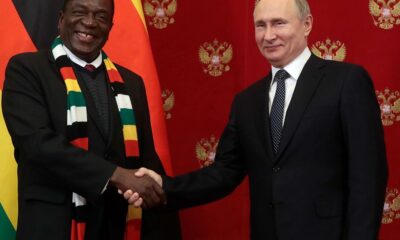
 Africa2 days ago
Africa2 days agoPutin hosts talks with African leaders on security
-

 Europe2 days ago
Europe2 days agoPope Leo XIV: A White Sox fan who calls his brother daily from Rome
-

 Sports2 days ago
Sports2 days agoShedeur Sanders aiming to ‘prove himself right’ instead of other ‘people wrong’ as he begins NFL career
-
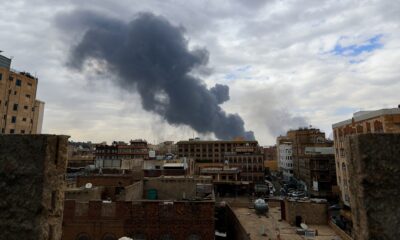
 Middle East1 day ago
Middle East1 day agoIsrael attacks Yemen’s Hodeidah, striking port areas | News
-

 Sports2 days ago
Sports2 days agoJannik Sinner has ‘remarkable’ return to tennis at Italian Open after doping ban
-

 Europe2 days ago
Europe2 days agoEverything you need to know about the Cannes Film Festival 2025
-

 Europe1 day ago
Europe1 day agoA bridge builder and quiet reformer. How Pope Leo will lead the Catholic Church
-
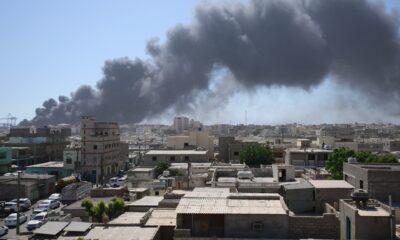
 Middle East1 day ago
Middle East1 day agoSudan’s army and RSF paramilitary launch attacks across war-ravaged nation | Sudan war News




